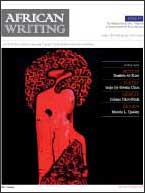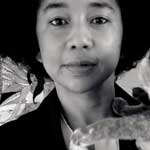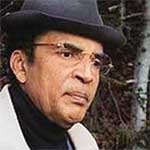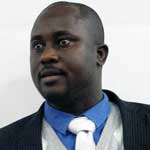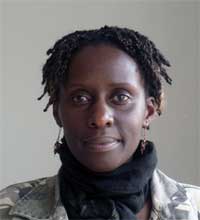My Son is a Story
This non-fiction is from a work-in-progress by Bitek telling the stories of abducted women who returned from the captivity of the Lord’s Resistance Army, the guerillas that have terrorized Uganda, DRC, Central African Republic and Sudan since 1987. This piece is about Grace’s son, and her escape from rebels after six years in captivity.
My son is a story that begins at my own beginning. Through him, I became a mother. I joined the throng of other mothers around the world. Ogenrwot was born in 1999. I was in captivity then. My son was the ultimate proof that beauty, life, hope, and everything else good is possible, even when there is desolation around you. My labour was not remarkable to anyone but me. The learning curve I had to overcome, learning to suckle a child, bathing him in steaming hot water; massaging his limbs so that his legs would grow straight, the way we have always done — all became possible when he chose me to be his mother. It was a choice. I believe it was a choice. His. He could have chosen anyone else. His father had many children with other women, but he chose to be my son and I learned to be a mother from him.
It was not as if I had no knowledge of how to mother children. Growing up; I’d had to carry my younger cousins on my back, feed them, lull them to sleep in Acholi when we lived in Gulu, or in Lango, my mother tongue. I carried the children of my co-wives, taking care of them as my own. They were all our children. Children don’t ask to be born. They choose their mothers and then wait to make their entrance when the time is right. So the first time I sang Min Atin, it came from the back of my throat and quieted him as if he remembered it from before.
Min atin do tedo dyewor
Min onyu nani tedo dyewor
Oneno dek ocek
Kel a gita gwok itura kore
Oneno dek numa numa
Dwok atin ka tuku tunu
The child minder sings about the mother who does not have time for her own child until it is time for dinner. And if the food is not yet ready, she reminds the babysitter to go back and play with the child. I sang to my baby and my body healed. My belly reverted to its previous taut flatness . To look at me then, it was hard to know that I was anybody’s mother, but my body was never the same after Ogenrwot came through me. As a baby, his head lay in the crook of my arm as if we were melded together. His baby breathing as he fell asleep after an exhausting hot bath and its accompanying full body massage made his belly rise and fall, rise and fall very fast. I’d turn him towards me so that our bellies touched and I could feel his quick breathing on me. Sometimes it felt as though he never ended and I never began.
I loved my son. I loved my son as mothers do, but I loved my son also because I only started to live after he came into my life. Not while I was expecting him. Not even when he started to kick about in my belly so lustily that I wondered just how many children were inside. When my body began to prepare itself for his coming, my belly would go tight, tight, like the embrace of strong invisible elastic tubing about me. Then I’d have to breathe through it. Breathe, someone told me. Breathe out slowly with your lips pursed. Your body needs to practice, too. So we prepared for my son’s coming, my body and I. The bones in my lower back seemed to loosen as did my hip joints. I’d hold my back as I’d seen pregnant women do, and finally understood why they did. I had cravings, morning sickness that seemed to last a lot longer than they said it would. My skin changed. My fingers and toes bloated like gloves filled with water. My nostrils whistled as I breathed. There was never quite enough air about. I wished to breathe in everything, breath out everything, so sometimes I breathed through my mouth, which was just enough for my baby and I. All these changes made me think that I was ready; that I had a clue about what to expect. Mothering. You suckled the child, you bathed the child, sang lullabies, groomed the child, disciplined the child, grew patient and waited for time to pass.
Nobody prepared me for the surge of feelings I had when he came. Nobody spoke to me about the irrevocable place I was in now that I was a mother. I was now responsible, not just for this other life, but for the first time, for my own life too. My son’s life depended on my well being. I mattered, not just to my family, who missed me terribly, I was sure; not just to my bush husband who tried his best to show me that he was capable of being anything but an old man, a rapist of young girls, a man with many other wives, several like me, old enough to be his granddaughters. I mattered also to my friends and schoolmates with whom we’d travelled all this distance together; to the people who might have heard of our plight and remembered us in their prayers; the ones that had gone before us and now hovered about, watching over us — but also to this little thing who reached out his small fist to my face, looking for a kiss. I was honoured and humbled.
More than ever, now I had to live and I had to live well. I had to eat well, sleep well, not worry too much about things that were of no consequence. Everything affected the amount of milk that came through for him. If I worried, the milk would turn sour and my son would close his mouth tight, turn his head and cry and cry and cry. If I was tense, the milk curdled. If I was hungry, there was not enough milk. If I was thirsty and breastfed, a harsh wind blew through my throat and I became so parched that my voice went hoarse. I lost a lot of weight and became very thin. And when I understood our link , the ghosts of the past lifted themselves and moved on, leaving images in my mind that allowed me to recount my stories without pain. The killings, the beatings, the canings, , the mutilations, the torture, the deaths I’d seen from bullet wounds, landmines, starvation, malaria and cholera were all reminders of why I had to be even more vigilant. I had to live for my son.
He toddled.
My son is a story that is just as ordinary as other children’s stories. He toddled, like they all do. My son got up, walked one step, two, fell on his bottom. We laughed. He got up again with his dusty bottom, held his arms out for balance and ran across the compound into the safety of my waiting arms. I carried him high as he laughed out loud, drooling onto my face and chest. I kissed him on the way down, as mothers everywhere do. My son is a story that has been told been told before. My son is a story that tells itself everyday, all the time. He grew into a little boy that could talk, walk, run little errands — fetch this and that from one step mother to another, carry a little container of water, watch. I wanted him to grow into a man who was aware of himself and his relationships with others around him. I wanted him to know that he was never alone, that he belonged. He belonged to me and with me. He belonged to his family, his clan, the African soil. I wanted him to know that there was another family waiting for him in another country. I wanted him to meet my family, to know the home I was born into, speak my language, and claim the ascendancy of the people of his blood. This was exile. This was tim. We were going to go home, my son and I. I wanted him to know where home was; that it was not here, not in this place.
I wanted my son to know the stories that we’d grown up with at wang’ oo, the night time fireside story telling where adults told folk tales after dinner until late. There was the Obibi, the ogre, who needed a haircut, but no one would give it to him. Why? Because, as the hare found out, you could only shave one half. By the time you started on the other, the first half was the same length as before you’d started. — and if you didn’t finish the haircut, you ended up a dinner for the ogre. We’d suck in our breaths, us kids, whenever we heard stories about the ogre. Obibi would come in the night to take away children who didn’t listen to their parents. We’d suck in our breaths again, hold both hands to our mouths, and promise inside ourselves that we’d always listen to our parents. Aha, the adults would say. You’ll see what can happen if you don’t listen. If I believed those stories, I might have thought that Obibi came to our school at Aboke and took us because we didn’t listen to our parents. But those were only stories for children. It was the rebels that took us. The rebels were students, themselves, fellow school mates; people I’d gone to school with. They were people who’d been forced to become rebels, same way as we had. These were humans, people like us. Obibi did not exist, except in the stories like those I told my son.
1999. My son was born in the third year of my captivity. By then, we’d been almost three years in Sudan, not counting the two months that it took to walk there. His birth was unremarkable, his infancy, special only to me. My son knew he was loved. My son was there when I started the trip back home to Uganda, back home. We almost got there. Freedom was so close. We were just three days away.. Three more days without water or food But my son vanished without a word to remember him by, without a photograph, baby clothes, a blanket into which I could immerse my face and imagine I could still smell him. He died instantly when a government helicopter gunship blew his head off.
In those days, the government claimed that they rescued children from the rebels and counted the number of rebels that they killed. My son is a story that belongs to every mother. My son listened to my stories about Obibi who would take him away if he didn’t listen. My son held both hands to his mouth as he sucked in his breath in horror of that idea. He promised he’d always listen to me My son was never a rebel. 
![]()

